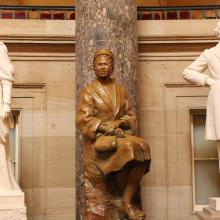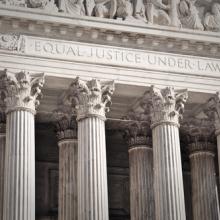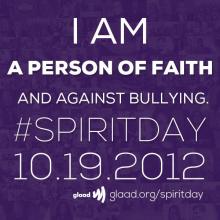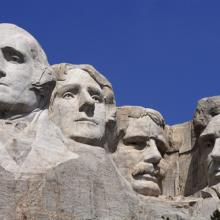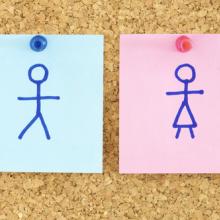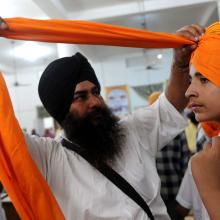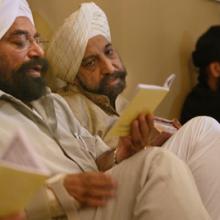Discrimination
Editor’s Note: As we continue reporting on the important topic of sexual abuse and violence, Sojourners has opened up the Sexual Violence and the Church blog series for submissions. This piece is one such submission. If you are interested in submitting a post for the series, please email the Web Editor HERE.
I know now, what I wish I knew then. Only after speaking up, did I learn how common stories like mine are to women across the globe. I know the warning signs and have a clearer picture of what is and isn’t acceptable behavior. I long for each of us to wrestle with the truth that we are never to blame — no matter how we dress, what we look like, or how much we’ve had to drink.
We never, ever deserve to have our bodies treated as objects of shame.
When Oklahoma voters overwhelmingly approved a 2010 ballot measure that prohibits state courts from considering Islamic law, or Shariah, the Council of American-Islamic Relations filed a lawsuit within two days challenging the constitutionality of the measure, and won.
But when Oklahoma Gov. Mary Fallin signed a similar measure, one that its sponsor said would forbid Shariah, on April 19 of this year, no legal challenges were mounted.
Why the change?
The biggest difference is that the older bill — and others like it — singled out Islam and Shariah, but also raised concerns that they could affect Catholic canon law or Jewish law. Many early anti-Shariah bills also made references to international or foreign law, which worried businesses that the new bills would undermine contracts and trade with foreign companies.
The new bills, however, are more vague and mention only foreign laws, with no references to Shariah or Islam. They also make specific exceptions for international trade. All of that makes them harder to challenge as a violation of religious freedom.
“These bills don’t have any real-world effect. Their only purpose is to allow people to vilify Islam,” said Corey Saylor, CAIR’s legislative affairs director, of the more recent bills.
This past weekend I attended the memorial for a very dear friend and amazing individual, Richard Twiss. Richard, who was a descendent of the Sioux and Lakota tribes of South Dakota, was a scholar, writer, speaker and thought leader. Richard was also a follower of Jesus.
Richard was both one of the most personable and charismatic individuals I’ve ever met. He had a way about him. I’ve never known someone so authentic and full of love as to make everyone he spent time with feel unique, special and valuable. Richard was also one of the sharpest prophetic voices I’ve ever heard. He was unyielding with logic and his respect for truth. He was hard as nails when it came to excuses from others who would try to compromise truth. Truth, for Richard, was unwavering.
If I was able to ask Richard today how best to honor him, I know that — after talking about his concern for his wife, kids, and grandkids — he would expect me to use my voice to speak truth.
Having achieved our freedom we can fall into the trap of washing our hands of difficulties that others face. We would be less human if we do so…we know too well that our freedom is incomplete without the freedom of the Palestinians.
- President Nelson Mandela- December 1997
There is visceral identification by South Africans with the suffering of the Palestinians.
Newspapers and speakers at South Africa Human Rights Day/U.N. International Day for the Elimination of Racial Discrimination focused on the liberation of the oppressed and the importance of a mobilized civil society to stand with the marginalized. The events commemorate the nonviolent protest against the racial passbooks, March 21, 1960. The day ended tragically with the Sharpeville massacre, which left 69 people dead and 180 injured. Nelson Mandela burned his discriminatory passbook a week later and the long march for freedom and dignity began in earnest. Even when it is still a journey in progress of real equality and democracy for all, there is an intentionality expressed best by Mandela.
When Ugandan parliament member, David Bahati, introduced the so-called “Kill the Gays Bill” in 2009, many Americans were shocked, including a group of 60 ecumenical Christian leaders who released a statement deploring the bill.
But as Frank Mugisha told Sojourners magazine earlier this year, what is perhaps more upsetting, albeit little known, is the level of influence American evangelicals have had in crafting Uganda’s violent homophobia.
Academy Award-winning director Roger Ross Williams hopes to put this issue front and center with his new film God Loves Uganda, which made its Washington, D.C., premiere Tuesday night at the Human Rights Campaign headquarters.
The film opens with Rev. Kapaya Kaoma, an Episcopal priest from Boston by way of Zambia, who went to Uganda in 2009 to study the relationship between American conservatives and the Ugandan people. What he found was that “religion was being used to demonize and even to kill.”
WASHINGTON — A bronze statue of civil rights heroine Rosa Parks was unveiled at the U.S. Capitol Wednesday, a day for members of her African Methodist Episcopal Church to celebrate one of their own.
President Barack Obama, capping an hourlong ceremony in Statuary Hall, recalled the desegregation of public buses in Montgomery, Ala., after a yearlong boycott that was sparked by Parks’ simple act of defiance: refusing to move to the back of the bus.
“And with that victory, the entire edifice of segregation, like the ancient walls of Jericho, began to slowly come tumbling down,” he said before hundreds gathered just outside the Capitol Rotunda.
As Parks was hailed for her civil rights achievements, members and leaders of her African Methodist Episcopal Church celebrated Parks taking her place among the monuments to American icons from every state and walk of life.
Parks was a stewardess, who helped with Communion and baptisms in her local AME congregation in Detroit, and also a deaconess, the highest position for a laywoman in the denomination. She died in 2005 at age 92.
I was on the airplane, looking forward to reading Taylor Branch’s new book, The King Years: Historical Moments in the Civil Rights Movement. As I opened my Kindle, I realized that it offered large excerpts of Branch’s previous works, and was glad that while I have the other books in hard cover, I had these stories in my Kindle. But as I re-read some of the accounts, I realized that my 40-something-old self reacted differently than when I first read some of the accounts when I was 20-something. My younger self yearned to know: How did they organize? How did they deal with differing motives and different movements? And I yearned to believe that I, too, would have sacrificed my being for “The Movement.”
My late 40-something-old self read these words as a mother — as someone who understood the fury of the parents who were scared as their children sacrificed their very lives for justice’s sake.
Our country’s laws represent our values and our moral compass as Americans. They set norms, define transgressions, and mete out consequences for actions. And almost 50 years ago, our nation realized the harassment, intimidation, bureaucratic shenanigans, and violence so many African-Americans and other minority communities experienced when trying to exercise their rights to vote and participate in our great democracy. Our intolerance of such injustice led to the passage of the Voting Rights Act of 1965 — a great triumph in the defense of life, dignity, and equality.
Notwithstanding the near-universal praise the Voting Rights Act has received for ending some of the most overt discriminatory practices in our country’s voting history, there are some saying the Voting Rights Act’s time has passed. In fact, on Wednesday, the Supreme Court will hear oral arguments from Shelby County, Ala., that a key provision of the Voting Rights Act is unconstitutional and should be struck down. These arguments are misguided. The Voting Rights Act remains a vital piece of our national moral commitment never to permit racial discrimination in elections again.
THE MEDIA UNIVERSE has been dominated for months by election coverage. Meanwhile, out there in America, something has been happening that could, in the long run, be much more significant than any election. The Age of Walmart may be coming to the beginning of its end.
Cracks in the big blue hegemony have been showing up here and there for the past few years. The bribery scandal involving Walmart's Mexican subsidiary did some damage. So have the grassroots campaigns against new Walmart stores in Denver, Miami, New York, and even the college town of Athens, Ga. In Athens, the anti-Walmart banner has been hoisted by the local alt- rock community. Check out "After It's Gone," a music video attributed to Patterson Hood (front man of the legendary Drive-By Truckers) and the Downtown 13.
But all that was just foreshadowing. In October, here and there around the country, the Walmart workforce began to publicly rattle its chains. The movement started in September in the Walmart supply chain, first with strikes by seafood workers in Louisiana, then warehouse workers in Southern California and Elwood, Ill., all of whom went out because of unsafe or inhumane working conditions. Within a month Walmart "associates" had walked out of stores in Dallas, Southern California, the Bay Area, Sacramento, Seattle, Miami, the Washington, D.C. area, and Chicago. Two hundred of these striking workers demonstrated at corporate headquarters in Bentonville, Ark., during the annual meeting of Walmart investors.
Twenty-five cents was all it took. It was like magic. The punches stopped and for the first time in a long time I felt what it feels like to be normal — to be safe, to be lovable, to live without a target on my back.
But even the transaction was not a guarantee of love.
Though I continued to bring quarters that fed the monster’s craving every day, after a while even their magic stopped working.
The torture started again on the playground after school.
I walked across the schoolyard and headed home, which was only a half-block away from the school. Suddenly I was surrounded by Alice and her goons. She taunted me and pushed me, then punched me. It didn’t stop. It became a ritual.
Soon, every day, armed with only my book bag, I would duck my head and make a beeline for my house and Miss Burton (the babysitter). And every day Alice and her bulldogs would hunt me down and taunt me and push me and punch me as I walked the looooong half-block home.
Mom asked one day what I was doing with all those quarters. When I told her, she marched up to the school and had it out with Miss Williams and then my principal. I was only in that school for one year.
Alice wasn’t the last bully I had to survive. There were others. There was Tracy in the fifth grade and two white girls whose names I’ve blocked out in eighth grade. For a long time I thought I must have an invisible target attached to my back.
The Wild Goose Festival was awesome as expected this weekend in Corvalis, Ore. About 1,000 folks gathered for the first-ever west coast version of the event started in North Carolina. There were artists, theologians, pastors, hippies, activists, poets, and any number of other curious observers, navigating the landscape to better understand where this movement might be headed.
I offered a workshop on Saturday with Brian Ammons and Bruce Reyes Chow on masculinity and male identity. Folks gathered in the small animal arena on the fairgrounds where the event was held to hear about, and respond to, male identity from three fairly distinct perspectives. It was a rich conversation and pretty fun, at least until one question came toward the end, from a guy in the back row.
I suppose we should have seen it coming, but we had gotten a little too comfortable. The following is a paraphrase of what he said, but the essence is the same.
Editor's note: This is a He Said, She Said on the issue. To read this author's husband's take, go HERE.
Who would have thought that five years into our marriage we would still be having this debate? Gender roles. Egalitarianism. Complementarianism.
If you've come here first, please read my husband's take on the issue before continuing on.
We tend to think fairly similarly, though he likes to think himself a complementarian, while I tend toward the egalitarian label. I love words, but that's all these are: words. I think it's all in how you define it for yourself. But since he brought it up …
Law enforcement authorities don't know why suspected gunman Wade Michael Page burst into a Sikh temple in Oak Creek, Wis., on Sunday and opened fire, killing six before he was shot dead by the police.
But many American Sikhs say they do know this: Their community has been targeted by a growing number of hate crimes since the 9/11 terrorist attacks. The New York-based Sikh Coalition reports more than 700 such incidents since 2001. The question is: Why?
"The turban is the main issue here," said Pashaura Singh, a professor of Sikh and Punjabi studies at the University of California-Riverside. "People confuse Sikhs with Osama bin Laden."
Following 9/11, bin Laden and his al-Qaida associates were often shown in media reports wearing white turbans. Combine that with a lack of basic knowledge about the estimated 500,000 Sikhs living in the U.S. and you get tragic — and sometimes violent — cases of mistaken identity.
TODAY, THE RIGHT to vote is under assault across the country. From photo ID requirements to restrictions on voter registration, there are new barriers to the ballot box. While proponents of recent election law changes claim those changes are “race-neutral,” the measures will have a disproportionate impact on minority voters.
In Florida, for instance, African Americans made up 32 percent of those who voted on the Sunday before Election Day 2008, often in “all souls to the polls” drives organized by historically black churches. They were among the nearly 8 million Americans who voted early. Florida, Georgia, Ohio, Tennessee, and West Virginia have since passed legislation reducing early voting.
The tea party-infused True the Vote, reportedly bankrolled by Far Right billionaires Charles and David Koch, plans to bring lawsuits to purge the voter rolls of allegedly ineligible voters. While the fear-inducing image of non-citizens voting has little to no basis in reality, it has real consequences.
In Florida, a law passed last year effectively stopped the League of Women Voters, Rock the Vote, and similar groups from conducting voter registration drives this spring. The law imposed restrictions on voter registration volunteers and subjected groups to $1,000-a-day fines if they didn’t turn in voter registration forms within 48 hours of completion. While parts of the law were temporarily blocked at the end of May by a federal judge as unconstitutionally “harsh and impractical,” it has already prevented civic groups from registering voters for some months. Registration drives encourage voting among the young and people of color, who often vote Democratic.
I have a love/hate relationship with the Olympics. I love the pageantry and global drama of it all. And even as one who hardly ever watches sports (I make exceptions for Roller Derby and Quidditch), I nevertheless find myself glued to the screen whenever the Olympics roll around. At the same time I am uneasy with the neo-colonial aspects of the Games and the fact that one’s ability to win a medal increasingly depends upon how much money one’s country has (making the Games a vivid illustration of global economic injustice). Yet even as I have watched (and enjoyed) the London Games with conflicted emotions, I find myself more and more uncomfortable with the ways the presentation of the Olympics serves to reinforce harmful assumptions about women in our culture.
It started before the Games. As the world geared up for the Olympics, it was hard to avoid hearing some guy or another (from TV hosts to bloggers) saying that what they were most looking forward to watching was women’s beach volleyball. It was this strange inside joke insinuating that the real purpose of the Games was to give them an opportunity to see women diving around in bikinis. I even heard complaints about the new Olympic rule allowing women to compete fully covered (a concession offered to allow Muslim women to compete in the Games). It was uncomfortable to hear how nonchalantly women continue to be reduced to mere sexual objects, but I brushed it aside as typical of our culture.
My second grader helped me understand that the story of Harriet Tubman is still being lived out today in the lives of Latino families in my school and across the country.
Mary Bauer and Sarah Reynolds authored the report “Under Siege: Life for Low-Income Latinos in the South for the Southern Poverty Law Center.”
They explain, "Latinos in the South—many of whom came here to escape crushing poverty in their home countries—are encountering wide-spread hostility, discrimination and exploitation."
This report helps us understand the struggle for life that many of our Latino students take on, a clandestine struggle like the one Harriet Tubman made all those years ago.
Sikh civil rights activists will unveil a mobile phone application next week (April 30) that they say will allow travelers who believe they have been profiled by airport screeners to file complaints directly from their cell phones.
The New York-based Sikh Coalition launched the app project after a steady increase of complaints about unfair treatment at U.S. airports. Sikh men do not cut their hair as an article of faith, and their turbans have been met with suspicion by some Transportation Security Administration personnel.
The group emphasized that that the “FlyRights” app is meant to help Sikhs and other religious and racial minorities who have been subject to profiling, such as Muslims, South Asians, Arabs, blacks, and Latinos.
A New Jersey appeals court has ruled that a man who alleges he endured anti-Semitic slurs can sue his former supervisors — even though he is not Jewish.
Myron Cowher, a former truck driver for Carson & Roberts Site Construction & Engineering Inc., in Lafayette, N.J., sued the company and three supervisors after he allegedly was the target of anti-Semitic remarks for more than a year.
Cowher, of Dingmans Ferry, Pa., produced DVDs that appear to show supervisors Jay Unangst and Nick Gingerelli making such comments in his presence as “Only a Jew would argue over his hours” and “If you were a German, we would burn you in the oven,” according to a state appeals court ruling handed down April 18.
"State of the Dream 2004: Enduring Disparities in Black and White," released in January by United for a Fair Economy, catalogues the continuing and, in some cases, worsening gaps of income, wealth, poverty, health, housing, education, and imprisonment among African-American and white populations in the



